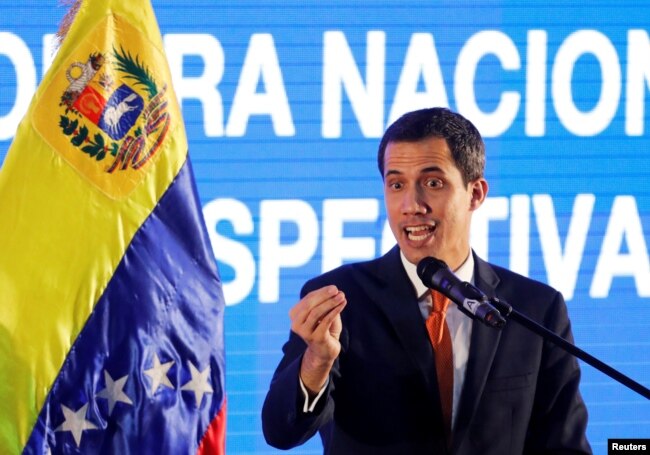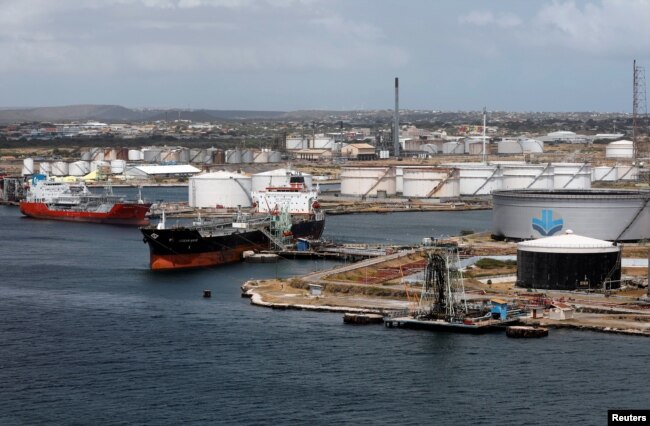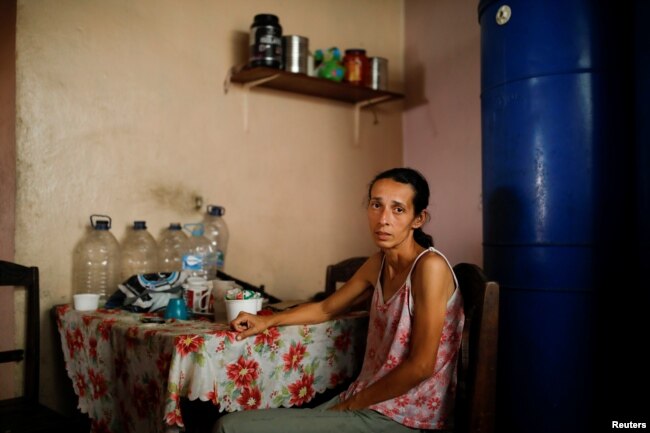Almost all of Venezuela’s revenues come from the sale of oil, and the United States is the biggest importer of Venezuelan crude, VOA News reports.
But because of sanctions against the state oil company, PDVSA, the Venezuelan government of embattled President Nicolás Maduro will not benefit from this inflow of capital.
The U.S. government did issue a license for U.S. refinery CITGO, a PDVSA subsidiary, to continue its operations in Venezuela. However, the money generated will not go to the Maduro government, but to accounts available to opposition leader Juan Guaidó, whom Washington and some 50 other countries recognize as the country’s interim president.
Trump administration officials say the sanctions could lead to losses of $11 billion for the Maduro government. The penalties will also impact production, since Venezuela will not be able to buy U.S. light crude oil to mix with its heavy crude. Without the light crude, the heavy crude cannot move through the pipelines to be shipped.
With these tough restrictions, the U.S. is trying to pressure Maduro to step down.
The sanctions seek to “exert pressure on Maduro and his allies, minimize their receipt of U.S. revenues and safeguard the U.S. financial system,” according to Sandra Oudkirk, deputy assistant secretary in the State Department’s Office of Energy Resources.
The premise is simple: leave the embattled president without money to finance what Marshall Billingslea, the Treasury Department’s assistant secretary for terrorist financing, called Maduro’s “kleptocracy” in a VOA interview.
Gustavo Marcano, a member of the interim government’s diplomatic commission in the United States, also told VOA the measure is a response to a “request from the Venezuelan people” so that a regime that uses resources for “its criminal activity” cannot continue to be financed.
Experts, however, agree that the sanctions also could have negative consequences for ordinary Venezuelans.
“The first ones who are going to suffer are the Venezuelans. I do not believe that the beneficiaries of the regime will be the most affected,” said Geoff Ramsey, assistant director for Venezuela at the Washington Office on Latin America.
Why? To unravel this issue, one must first understand a key aspect of the Venezuelan economy: imports.
How much does Venezuela depend on imports?
Last year, Venezuela spent more money importing food (including plant products, animals and soybean oil) than refined oil, according to the Observatory of Economic Complexity at the Massachusetts Institute of Technology.
According to Rodrigo Agudo, general director of the Venezuelan Meat and Milk Institute (INVELCAR), there is little food production in Venezuela. Therefore, “[Right now] the only way to guarantee food supply is with imports,” he told VOA.
Agudo, who has been a vocal critic of the Maduro government’s agricultural policies, said domestic production has been in a tailspin since 2008, when “agriculture began to fall and be replaced by the imported product.”
He attributes this to a “process of intervention of lands and expropriations” by the government that “reduced the internal supply.”
Consumers did not see the effect of these policies until 2013, when lower oil prices precipitated the economic crisis that Venezuela currently suffers and limited the country’s ability to import the products on which it depended.
“Imports have fallen because the state has no foreign currency to be able to guarantee them,” said Agudo.
The impacts are the images of Venezuela broadcast around the world: empty supermarkets and more recently, malnutrition and hunger. The lack of food has become one of the reasons cited by the nearly 3 million Venezuelans who have left the country in recent years.
The problem, then, is not only that little is produced but that there is no incentive to import.
Francisco Rodríguez is chief economist with the New York-based Torino Capital investment fund. Assessing the situation in the South American country, he said, “What is eaten in Venezuela [comes] primarily from imports carried out by the Venezuelan state” or from the private sector that depends to a large extent on “the dollars exchanged by the Venezuelan state.”
“If you take the Venezuelan government’s dollars, you take away the Venezuelan economy’s dollars and without dollars entering the country there is no way to buy food,” Rodriguez said via Skype.
After the United States, the other major buyers of Venezuelan oil include China (with 23 percent of exports in 2016) and India (with 19 percent). Oil sales to China do not represent cash income, according to Antonio de la Cruz, an oil specialist.
“The likelihood of the Chinese or Indian market replacing the U.S. market is low,” said de la Cruz, who explained that the barrels that PDVSA has been sending to China, its second major buyer, are going toward debt payments.
Effect on the population
De la Cruz says he does not believe that the sanctions will affect the Venezuelan population. “The one who has difficulty obtaining the dollars is the Maduro government and that money is used to manage corruption,” he said.
Rodriguez disagrees. “To say that the government steals 100 percent is to say that there is absolutely nothing — that zero percent reaches the people is clearly false. If that were the case,” said the economist, “Venezuelans would not be eating anything.”
A similar assessment was made by three experts before the U.S. House of Representatives in a recent hearing on Venezuela.
In response to questions from lawmakers of the impact of sanctions on ordinary Venezuelans, Santiago Cantón, former executive secretary of the Inter-American Commission on Human Rights, said he wanted to see a better way to deliver humanitarian aid to the country to alleviate the lack of agricultural goods caused by sanctions.
“The key here is to make sure that Guaidó has the power to import [food],” Cantón said.
Rodríguez proposes that a food-for-oil program be implemented, as was done in Iraq under U.N. supervision in 1995, to prevent the worsening of the humanitarian crisis in Venezuela.
If measures of this type are not taken, the economist predicted, “Venezuela will suffer a humanitarian catastrophe such as we have not seen in the Western Hemisphere.”



